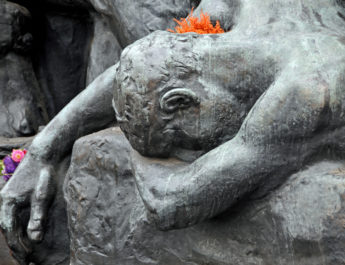Luke 1:68-79
Narrative Lectionary 345
68 “BlessedA be the LordB GodC of Israel,D
A “blessed” = eulogetos. 8x in NT. From eulogeo (speaking well of – speaking so that the other is benefited; praise, bless, thank, or call for a blessing); {from eu (good, well, well done, rightly) + logos (word, statement, speech, analogy; a word that carries an idea or expresses a thought, a saying; a person with a message or reasoning laid out in words; by implication, a topic, line of reasoning, or a motive; can be used for a divine utterance or as Word – Christ); {from lego (to speak, tell, mention)}}. This is blessed, spoken well of, to be praiseworthy, or adorable. This is the root that “eulogy” comes from.
B “Lord” = kurios. From kuros (authority, supremacy). This is a respectful address meaning master or sir. It refers to one who has control or power greater than one’s own. So, it was also applied to God and Jesus as Master or Lord.
C “God” = Theos. From Proto-Indo-European origins, meaning do, put, place. This is God or a god in general.
D “Israel” = Israel. From Hebrew Yisrael (God strives or one who strives with God; new name for Jacob and for his offspring); {from sarah (to persist, exert oneself, contend, persevere, wrestle, prevail) + el (God or god)}. This is Israel the people and the land.
for he has looked favorablyE on his peopleF and redeemedG them.
E “looked favorably” = episkeptomai. 11x in NT. From epi (on, upon, at, what is fitting) + the base of skopos (a mark or goal like the marker at the end of a race; figuratively, other goals or destinations; also, a watch or sentry); {from skeptomai (to peer out, consider, gaze carefully); perhaps related to skapto (to dig or excavate)}. This is to look at, look out for, see, select, visit.
F “people” = laos. This is the people or crowd – often used for the chosen people. This is where the word “laity” comes from.
G “redeemed” = poieo + lutrosis. Poieo is to make, do, act, construct, abide, or cause. Lutrosis is 3x in NT. From lutroo (to redeem, liberate, release because ransom was paid in full; figuratively, returning something or someone to their rightful owner); from lutron (ransom, the money used to free slaves; also a sacrifice of expiation; figurative for atonement); from luo (to loose, release, untie; figuratively, to break, destroy, or annul; releasing what had been withheld). This is ransoming, release, liberation, or redemption It is paying to free someone from imprisonment because of debt or from slavery more generally. Used figuratively for spiritual redemption.
69 He has raised upH a mightyI savior for us
in the houseJ of his servantK David,L
H “raised up” = egeiro. This is to awake, raise up or lift up. It can be to get up from sitting or lying down, to get up from sleeping, to rise from a disease or from death. Figuratively, it can be rising from inactivity or from ruins.
I “mighty savior” = keras + soteria. Literally “horn of salvation.” Keras is 11x in NT. Perhaps from kar (hair). This is horn or something that looks like a horn. It can refer to an animal’s horn or symbolically refer to might or power that overcomes through strength. It is horn in a literal or figurative sense. Soteria is from soter (a savior, deliverer); from sozo (to save, heal, preserve, or rescue; taking someone from danger to safety; delivering or protecting literally or figuratively); from sos (safe, rescued, well). This is deliverance, salvation, preservation, welfare, prosperity, safety.
J “house” = oikos. This is house – the building, the household, the family, descendants, the temple.
K “servant” = pais. Perhaps from paio (to strike or sting). This is child, youth, servant, or slave.
L “David” = Dauid. From Hebrew David (David); from the same as dod (beloved, love, uncle); the root may mean to boil, which is used figuratively to describe love. So, this implies someone you love such as a friend, a lover, or a close family member like an uncle. David’s name likely means something like “beloved one.”
70 as he spoke through the mouthM of his holyN prophetsO from of old,P
M “mouth” = stoma. Perhaps from tomoteros (sharp, keener); from temno (to cut). This is mouth, speech, language, the tip of a sword, an opening in the ground.
N “holy” = hagios. From hagnos (holy, sacred, pure ethically, ritually, or ceremonially; prepared for worship, chaste, unadulterated, pure to the core; undefiled by sin; figurative for innocent, modest, perfect). God is totally different from humanity and thus set apart. That which is consecrated to worship God (elements of worship) or to serve God (as the saints) are holy because they are now set apart for God’s purposes. Holy because important to God. This is sacred physically, pure. It can be morally blameless or ceremonially consecrated.
O “prophets” = prophetes. From pro (before, in front of, earlier than) + phemi (to declare, say, use contrasts in speaking to shed light on one point of view); {from phao (to shine) or phaino (to bring light, cause to appear, shine, become visible or clear)}. This is a prophet or poet – one who speaks with inspiration from God.
P “old” = aion. From the same as aei (ever, always, unceasingly, perpetually; on every occasion). This is an age, cycle of time, course, continued duration. It is also used to describe the eternal or forever. This is the word used to discuss the present age or the messianic age.
71 that we would be savedQ from our enemiesR and from the handS of all who hateT us.
Q “saved” = soteria. Same as “savior” in v69. See note I above.
R “enemies” = echthros. From echthos (hatred). This is an openly hostile person so an enemy, a foe, or a hated person. This speaks of irreconcilable hostility. It can also mean adversary and/or refer to Satan.
S “hand” = cheir. This is the hand in a literal sense. Figuratively, the hand is the means a person uses to accomplish things so it can also mean power, means, or instrument.
T “hate” = miseo. From misos (hatred). This word is used in two ways in the New Testament. One has to do with how we prioritize. In order to prioritize something the highest, it means we have to rank other things lower. We cannot have 10 number one priorities. So, the nine that are not number 1, we love less or we value them lower. We make a moral choice the springs from our values about where we put our time, efforts, energy, etc. The other way is detesting or hatred as we normally think of it. This sense has a particular affinity with persecuting the one we hate.
72 Thus he has shownU the mercyV promised to our ancestors,W
and has rememberedX his holy covenant,Y
U “shown” = poieo. Same as “redeemed” in v68. See note G above.
V “mercy” = eleos. This is mercy, pity, tender mercy, or compassion, whether from humans or from God. This is mercy, generally understood in action by word or deed. When we sing or say “kyrie eleison” (Lord, have mercy), it is related to this word.
W “ancestors” = pater. This is father in a literal or figurative sense. Could be elder, senior, ancestor, originator, or patriarch.
X “remembered” = mimnesko. From mnaomai (to remember; by implication give reward or consequence); perhaps from meno (to stay, abide, wait, endure). This is to remind or remember. It is memory through an active, intentional process or being mindful of. It is not incidentally or accidentally remembering.
Y “covenant” = diatheke. From diatithemi (to place separately – to make a will or covenant; this is arranging ahead of time how things will be accomplished); {from dia (through, because of, across, thoroughly) + tithemi (to put, place, set, fix, establish in a literal or figurative sense; properly, this is placing something in a passive or horizontal position)}. This is a will, covenant, contract, or agreement.
73 the oathZ that he swore to our ancestor Abraham,AA
to grant us 74 that we, being rescuedBB from the hands of our enemies,
Z “oath” = horkos. 10x in NT. Related to erkos (fence, enclosure); perhaps related to horion (boundary, territory); from horos (limit, boundary). This is an oath or vow. It is something with limits, done for a sacred purpose.
AA “Abraham” = Abraam. From Hebrew Abraham (exalted father); from the same as Abiram (exalted father, a high father – lofty) {from ab (father literal or figurative) + rum (rise, bring up, being high, extol, exalt, haughty; to raise in a literal or figurative sense)}. This is Abraham, father of many nations or father of a multitude.
BB “rescued” = rhuomai. 18x in NT– including from the Lord’s prayer “deliver us from evil”. Related to eruo (to draw or drag) OR related to rheo (to flow, overflow). This is to rescue or set free. It is to deliver from danger, to snatch up.
might serveCC him without fear,DD 75 in holinessEE and righteousnessFF
beforeGG him all our days.
CC “serve” = latreuo. From latris (a hired servant; someone who is qualified to perform a technical task). Properly, this is giving good, technical service because qualified or equipped to do so. It can be serve, minister, worship, or give homage.
DD “without fear” = aphobos. 4x in NT. From a (not, without) + phobos (panic flight, fear, fear being caused, terror, alarm, that which causes fear, reverence, respect); {from phebomai (to flee, withdraw, be put to flight)}. This is without fear or cause – also shamelessly, securely, fearlessly.
EE “holiness” = hosiotes. 2x in NT. From hosios (righteous, pious, holy, devout, or Holy One; what is worthy of respect or reverence because it corresponds to a higher law). This is holiness or godliness. It is ordained by God and therefore holy and righteous.
FF “righteousness” = dikaiosune. From dikaios (correct, righteous – implies innocent; this is that which conforms to God’s notion of justice, uprightness); from dike (the principle of justice; that which is right in a way that is very clear; a decision or the execution of that decision; originally, this word was for custom or usage; evolved to include the process of law, judicial hearing, execution of sentence, penalty, and even vengeance; more commonly, it refers to what is right); may be from deiknumi (to show, point out, exhibit; figurative for teach, demonstrate, make known). This is judicial or divine approval of character or action. This is righteousness, justice, justness, divine righteousness.
GG “before” = enopios. From en (in, on, at, by, with, among) + ops (eye, face); {from optanomai (to appear, be seen)}. This is literally “in the eye of” and is used for before or in the presence of.
76 And you, child,HH will be calledII the prophet of the Most High;
for you will goJJ before the Lord to prepareKK his ways,LL
HH “child” = paidion. Related to “servant” in v69. From pais (see note K above). This is a child as one who is still being educated or trained. Perhaps one seven years old or younger. Used figuratively for an immature Christian.
II “called” = kaleo. Related to keleuo (to command, order, direct); from kelomai (to urge on). This is to call by name, invite, to name, bid, summon, call aloud.
JJ “go” = proporeuomai. 2x in NT. From pro (before, earlier, above) + poreuomai (to go, travel, journey, or die; transporting things from one place to another and focuses on the personal significance of the destination)}. This is to go before, precede like a guide does or one who is bringing news.
KK “prepare” = hetoimazo. From hetoimos (make ready, be ready because of being prepared, standing by, adjusted; ready to meet some opportunity or challenge). This is to prepare or provide.
LL “ways” = hodos. This is way, road, path, or journey. It can imply progress along a route.
77 to give knowledgeMM of salvationNN to his people
by the forgivenessOO of their sins.PP
MM “knowledge” = gnosis. From ginosko (to know, recognize, realize, perceive, learn; gaining knowledge through personal experience). This is knowing, knowledge, understanding, wisdom. It is direct knowledge – working knowledge that links theory and application.
NN “salvation” = soteria. Same as “savior” in v69. See note I above.
OO “forgiveness” = aphesis. 17x in NT. From aphiemi (to send away, release, abandon, lay aside, forgive); {from apo (from, away from) + hiemi (to send, to go)}. This is sending away – a release or letting go. So, it can be releasing someone from debt, slavery, or some other obligation – thus, freedom or liberty. Figuratively it can mean to pardon as releasing from the debt of sin.
PP “sins” = hamartia. From hamartano (to miss the mark, do wrong, make a mistake, sin); {from a (not) + meros (a part or share)}. Literally, this means not having one’s share or portion – like not receiving inheritance or what was allotted to you. This word means missing the mark so it is used for guilt, fault, and acts of sin.
78 By the tenderQQ mercy of our God,
the dawnRR from on high will break uponSS us,
QQ “tender” = splagchnon. 11x in NT. Perhaps from splen (spleen). This is inner organs, entrails, heart, liver. The guts were seen as the root of emotions. So, this could be visceral empathy or sympathy.
RR “dawn” = anatole. 11x in NT. From anatello (rise, shine, or dawn; most often used of the sun; figuratively, achieving a goal or reaching consummation after completing the needed steps); {from ana (up, again, back, anew) + tello (to cause to arise); {from telos (an end, aim, purpose, completion, end goal, consummation, tax)}. This is rising, as in the place where the sun rises. So, it refers to the east.
SS “break upon” = episkeptomai. Same as “looked favorably” in v68. See note E above.
79 to give lightTT to those who sitUU in darknessVV and in the shadowWW of death,XX
to guideYY our feet into the way of peace.”ZZ
TT “give light” = epiphaino. Related to “prophets” in v70. 4x in NT. From epi (on, upon, among, what is fitting) + phaino (see note O above). This is to appear, shine, become visible or known.
UU “sit” = kathemai. From kata (down, against, throughout, among) + hemai (to sit). This is to sit, be enthroned, or reside.
VV “darkness” = skotos. Perhaps from the base of skia (shadow, thick darkness, outline; figurative for a spiritual situation that is good or bad). This is darkness literal or figurative – as moral or spiritual darkness, sin and what comes from it. This can also mean obscurity.
WW “shadow” = skia. Related to “darkness” in v79. 7x in NT. See note UU above.
XX “death” = thanatos. This is death, whether literal or spiritual. It can also refer to something that is fatal.
YY “guide” = kateuthuno. Related to “covenant” in v72. 3x in NT. From kata (down, against, throughout, among) + euthuno (to guide, steer, make a straight direction); {from euthus (immediately, upright, straight and not crooked); {perhaps from eu (good, well, well done, rightly) + tithemi (see note Y above)}}. This is to make straight i.e. take the most direct route. It can also mean to direct or guide.
ZZ “peace” = eirene. Perhaps from eiro (to join, tie together to form a whole). This is one, peace, quietness, rest, peace of mind, harmony. Peace was a common farewell among Jews (i.e. shalom) and this well-wishing included a blessing of health and wholeness for the individual. This word also indicates wholeness and well-being – when everything that is essential is joined together properly. This is peace literally or figuratively. By implication, it is prosperity (but not in the sense of excessive wealth. Prosperity would have meant having enough from day to day.)
Image credit: “Laments of the Horizon” by Storm Crypt, 2008.




